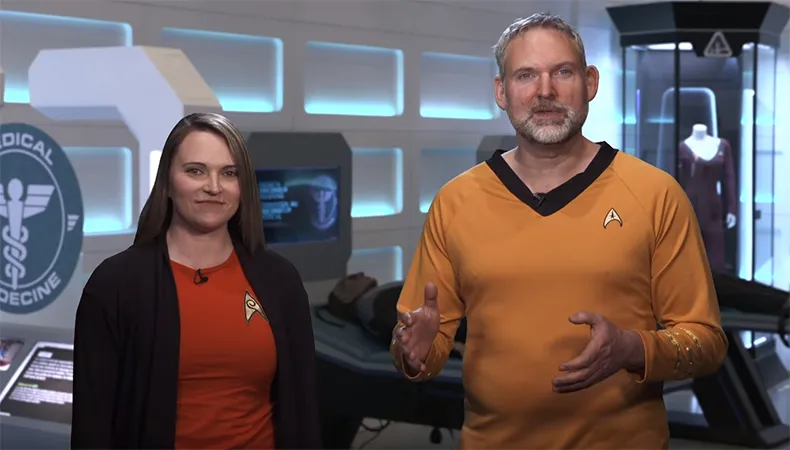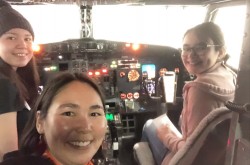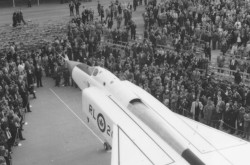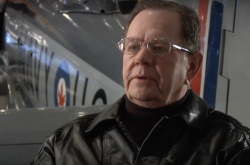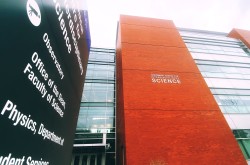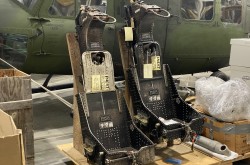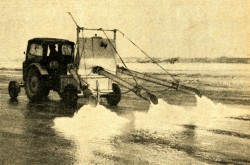Science Alive! Episode 8: The Science behind Star Trek
Would teleportation work in real life? How fast is ‘warp speed’? On this episode of Science Alive, Dave chats with Erin Gregory, Assistant Curator for the Canada Aviation and Space Museum, all about the science behind Star Trek! On May 13th, 2016, the Canada Aviation and Space Museum launched an out of this world exhibition: Star Trek: The Starfleet Academy Experience.
Transcript
00:18
here at Starfleet Academy there are lots
00:21
of career opportunities which one is
00:23
right for you find out in this edition
00:24
of science alive I'm with Aaron Gregory
00:28
she is an assistant curator here at the
00:29
canada aviation of space museum hello
00:31
Aaron hi Dave now what is Starfleet
00:33
looking for in a medical officer well
00:36
medical officers and Starfleet have kind
00:39
of unique challenges in fact that they
00:41
don't just have to treat humans they
00:43
have to treat many many different
00:45
species it's complicated it's very
00:47
complicated so they've got to keep all
00:49
that information and check they've got
00:50
to be able to recognize different
00:52
anatomies figure out what curious
00:55
ailments they might have right and treat
00:59
them accordingly okay so how much
01:01
training is there be a lot of training
01:04
involved for sure but I think a lot of
01:06
this stuff at least in in our
01:07
experiences is kind of on the fly
01:10
learning on the fly right just to become
01:13
a doctor I mean you get a fair amount of
01:15
training and then there's an awful lot
01:17
of in the field experience is that what
01:20
Starfleet looks for as well for sure I
01:21
think in order to be a chief medical
01:23
officer certainly you need to have a lot
01:25
of experience as a medical officer just
01:27
kind of getting in and you know maybe
01:29
you get your first assignment you always
01:30
work under a chief medical officer and
01:32
learn from their experience and
01:34
certainly a huge field here at Starfleet
01:36
is engineering definitely engineering is
01:39
very important there are specialized
01:41
positions within engineering yep for
01:43
sure you have engineers and they'll have
01:45
various specialties within that overall
01:48
team and then there's the chief engineer
01:50
who is responsible for all the other
01:53
engineers what are some of the
01:55
responsibilities of the engineering
01:57
division on the starship so the
01:59
responsibilities of the engineering
02:00
division are wide they are they vary
02:04
widely they have to maintain the warp
02:07
core that's super important to to keep
02:09
the ship running they also maintain
02:10
things like impulse engines the
02:12
Replicators the transporter is you know
02:16
section within the engineering division
02:17
and basically all the ship systems
02:20
life-support also very important to
02:22
board a starship and what are the
02:24
aptitudes that Starfleet is looking for
02:26
for that I mean creativity is really big
02:29
really can you sort of a computerized
02:31
sort of physics is physics kind of thing
02:33
definitely and they certainly have to
02:35
have really strong knowledge of science
02:37
and math and you know utilize those in
02:40
in pretty much their all their
02:42
day-to-day operations but there is an
02:44
element of creativity and taking those
02:47
principles and kind of turning them on
02:48
their head in times whenever it's
02:50
required figuring out creative solutions
02:52
to get more power from one area of the
02:54
ship to another and really thinking in a
02:57
broad way about how the entire ship
03:00
functions and being able to get it to do
03:02
what you needed to do another critical
03:04
command position on a starship is the
03:06
first officer what's the relationship
03:08
between the first officer and the
03:10
captain captain obviously hugely
03:12
important role in on a board a starship
03:15
so the captain has to essentially take
03:18
stock of everything that's going on so
03:20
all of ships operations they have a team
03:23
of advisors that are you know usually
03:25
the chief so the chief engineer chief
03:27
medical officer is first officer
03:28
certainly he you know takes advice and
03:31
reports on a daily basis from each of
03:34
those people and determines kind of you
03:37
know the priorities for Starfleet he you
03:39
know he gets gets direction from the
03:42
Admirals and all that at Starfleet
03:44
Command he's responsible for telling the
03:46
ship where it needs to go how fast it
03:47
needs to get there making complicated
03:50
negotiations with variety of species
03:52
kind of understanding their cultural
03:54
practices in order to make those
03:56
negotiations smoother and and just has
04:00
to have a kind of a wide knowledge base
04:04
in order to properly make effective and
04:07
quick decisions on everything that goes
04:10
on in the starship now in Starfleet do
04:12
you train for command or do you start in
04:15
another area and then move into command
04:17
further along in your career command is
04:19
a stream but you can certainly come to
04:22
command from a variety of different
04:24
specialties so for example Kathryn
04:27
Janeway who later becomes an admiral she
04:29
comes up through science so she was
04:31
actually a science officer and through
04:33
her experience over the course of her
04:34
career became the captain of the
04:37
starship right there are
04:39
are examples of chief medical officers
04:43
that become captains and command medical
04:46
ships so you can come at it from a
04:48
variety of different ways and but
04:51
certainly you know command is a stream
04:52
on its own lots of options here at
04:54
Starfleet Erin if somebody wants to try
04:56
though for themselves what do they do
04:57
now you just come down to the Canada
04:59
aviation and Space Museum the Starfleet
05:02
Academy the experience runs till
05:03
September fifth Thank You Erin Erin
05:05
Gregory an assistant curator here at the
05:07
canada aviation and space museum this
05:09
was science alive



